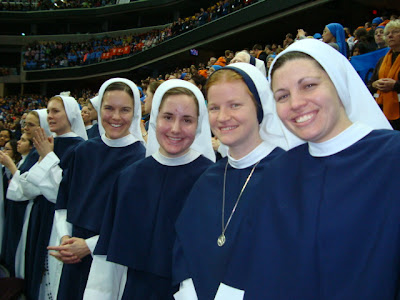 Evil is of two kinds, moral and physical. The Lord expels the demons by force of His Divine power and thus frees the suffering one from this oppression.
Evil is of two kinds, moral and physical. The Lord expels the demons by force of His Divine power and thus frees the suffering one from this oppression."The fact that God permits physical and even moral evil is a mystery that God illuminates by his Son Jesus Christ who died and rose to vanquish evil. Faith gives us the certainty that God would not permit an evil if he did not cause a good to come from that very evil, by ways that we shall fully know only in eternal life." (CCC 324)
Worse than physical evil is the moral evil whereby man misuses the gift of free will and chooses to disobey God. This evil we call sin.
"Man, enticed by the Evil One, abused his freedom at the very beginning of history. He succumbed to temptation and did what was evil. He still desires the good, but his nature bears the wound of original sin. He is now inclined to evil and subject to error:
'Man is divided in himself. As a result, the whole life of men, both individual and social, shows itself to be a struggle, and a dramatic one, between good and evil, between light and darkness.' " (CCC 1707)
Christ is anointed, He is "the Holy One" in whom the holiness of God is found in its fullness, for He is "anointed with the Holy Spirit and with power". He is man's only hope in the struggle against evil. In Him only are we made holy through His power to cast out evil.
"Jesus' messianic consecration reveals his divine mission, 'for the name "Christ" implies "he who anointed," "he who was anointed" and "the very anointing with which he was anointed." The one who anointed is the Father, the one who was anointed is the Son, and he was anointed with the Spirit who is the anointing.'(St. Irenaeus, Adv. haeres., 3, 18, 3:PG 7 / 1, 934.)
"His eternal messianic consecration was revealed during the time of his earthly life at the moment of his baptism by John, when 'God anointed Jesus of Nazareth with the Holy Spirit and with power,' 'that he might be revealed to Israel' (Acts 10:38; Jn 1:31) as its Messiah. His works and words will manifest him as 'the Holy One of God.' " (Mark 1:24; John 6:69; Acts 3:14) (Catechism of the Catholic Church, 438.)
Meeting Christ in the Liturgy offers a reflection for the Fourth Sunday in Ordinary Time.
(Art: Jesus Expels Demons, Stephen Sly.)













.JPG)
.JPG)

.JPG)

.JPG)


























